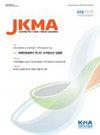Management of the adverse effects of targeted therapy for cancer
IF 0.5
Q3 MEDICINE, GENERAL & INTERNAL
引用次数: 0
Abstract
Background: Advances in genomics and molecular biology over the past 20 years have resulted in numerous approved molecular targeted cancer therapies. The two main approaches for targeted cancer therapy are monoclonal antibodies and small molecules. Targeted therapy is expected to exert few side effects, but a new class of toxicities has been reported. Thus, the classical chemotherapy-induced toxicities of alopecia, myelosuppression, mucositis, nausea, and vomiting have been replaced in patients receiving targeted therapies by dermatologic, cardiovascular, gastrointestinal, endocrine, ocular, and pulmonary toxicities, and infusion reactions.Current Concepts: Targeted therapy toxicities vary, but common side effects include skin rash, diarrhea, and stomatitis. Most of these side effects are mild and can be prevented and treated. Rare and dangerous side effects, including pneumonitis, cardiotoxicities, and infusion reactions, can also be induced by targeted therapies. In most cases, toxicities are low grade (grade ≤2) and can be treated effectively, but in some cases, they can be fatal without appropriate intervention. Symptoms can be nonspecific, rendering identification of early symptoms challenging. Physicians should thus be aware of these side effects and manage toxicities appropriately.Discussion and Conclusion: The side effects of targeted therapy exert a critical impact on survival and quality of life. Most patients receiving targeted therapy need help to prevent and relieve toxicities. Management of the toxicities of targeted therapy involves patient monitoring, adjusting therapeutic dose or frequency, and providing supportive care. Serious side effects require early detection and prompt intervention, including discontinuation of targeted therapy and the use of corticosteroids.肿瘤靶向治疗不良反应的管理
背景:在过去的20年里,基因组学和分子生物学的进步导致了许多被批准的分子靶向癌症治疗。靶向癌症治疗的两种主要方法是单克隆抗体和小分子。预期靶向治疗几乎没有副作用,但一类新的毒性已被报道。因此,在接受靶向治疗的患者中,经典的化疗引起的脱发、骨髓抑制、粘膜炎、恶心和呕吐等毒性已被皮肤、心血管、胃肠道、内分泌、眼部和肺部毒性和输液反应所取代。当前概念:靶向治疗的毒性各不相同,但常见的副作用包括皮疹、腹泻和口炎。这些副作用大多是轻微的,可以预防和治疗。罕见和危险的副作用,包括肺炎、心脏毒性和输液反应,也可以通过靶向治疗诱导。在大多数情况下,毒性为低级别(≤2级),可以有效治疗,但在某些情况下,如果不进行适当干预,它们可能是致命的。症状可能是非特异性的,这使得早期症状的识别具有挑战性。因此,医生应该意识到这些副作用,并适当地管理毒性。讨论与结论:靶向治疗的副作用对患者的生存和生活质量有重要影响。大多数接受靶向治疗的患者需要帮助预防和减轻毒性。靶向治疗毒性的管理包括患者监测、调整治疗剂量或频率以及提供支持性护理。严重的副作用需要早期发现和及时干预,包括停止靶向治疗和使用皮质类固醇。
本文章由计算机程序翻译,如有差异,请以英文原文为准。
求助全文
约1分钟内获得全文
求助全文
来源期刊

Journal of The Korean Medical Association
Medicine-General Medicine
CiteScore
0.50
自引率
0.00%
发文量
84
审稿时长
4-8 weeks
期刊介绍:
The Journal of the Korean Medical Association (JKMA) is the official peer-reviewed, open-access, monthly journal of the Korean Medical Association (KMA). It contains articles in Korean or English. Its abbreviated title is ''J Korean Med Assoc''. The aims of the Journal include contributing to the treatment of and preventing diseases of public health importance and to improvement of health and quality of life through sharing the state-of the-art scientific information on medicine by the members of KMA and other national and international societies.
 求助内容:
求助内容: 应助结果提醒方式:
应助结果提醒方式:


